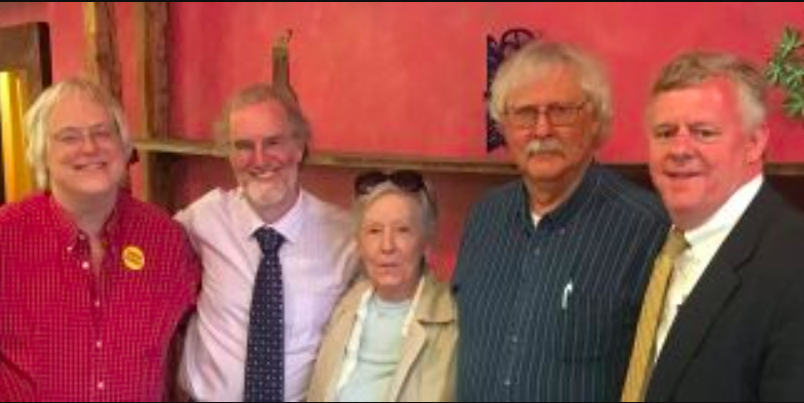By Edward Hasbrouck, April 20, 2018
From The Practical Nomad

I testified at a hearing Thursday in Denver before the National Commission on Military, National, and Public Service. Below is my oral testimony (I also submitted a longer written statement for the record), followed by some notes about the hearing. Note that the Commission has scheduled seven more hearings around the country, the next of which will be 20 May 2018 in Nashua, NH, and has extended its deadline for accepting written comments through 30 September 2018.
My name is Edward Hasbrouck, and the service of which I’m most proud is that in 1983 and 1984 I served 4 1/2 months in a Federal Prison Camp for refusing to register with the Selective Service System.
Draft registration was reinstated in 1980 in response to the Soviet invasion of Afghanistan. But if the U.S. had sent draftees to Afghanistan then, which side would we have been on?
At that time the U.S. was backing fighters including those who would later call themselves the Taliban and Al Qaeda. The U.S. government put me in prison for refusing to agree to fight on the side of the Taliban and Al Qaeda. What does that say about whether we should allow the government to decide for us which wars we should fight, or on which side?
I came here today from San Francisco to point out that, like it or not, draft registration has failed. Most of the people subject to draft registration have violated the law, and most induction notices would end up in the dead letter office. Draft registration proved unenforceable, and the Department of Justice gave up trying to prosecute registration resisters 30 years ago.
One of the questions for this Commission is whether a draft would be feasible. As I discussed in my more detailed written comments, the historical evidence is clear that no draft is feasible today because noncompliance would render any attempt at a draft unenforceable.
Draft registration has continued only because there’s been no face-saving way for the government to admit that its power to conscript is constrained by the willingness of potential draftees to submit.
I urge this Commission to look closely at the issues of noncompliance and enforcement, and to report back to Congress and the President that, whether or not you agree with or even understand the reasons for our resistance, a draft is not feasible and draft registration should be ended.
My written comments also address the other question asked by this Commission: What could the government could do to encourage “service”?
First, I agree with what others here have said: “compulsory service” is, by definition, slavery. If you want to encourage any positive definition of service, it must be voluntary, and completely separate from any system of conscription.
Second, “military service” is, by definition, service to the cause of war. If you want to encourage any non-warlike notion of “service”, you need to separate it completely from military recruiting, military training, or incentives for military enlistment.
Third, people can best “serve” by making their own choices. “Service” should not be limited to options approved by the government. We need to allow young people to lead, not force them to follow.
Fourth, and most importantly, the greatest limitation on the ability to “serve”, especially for young people, is student debt that forces people to seek higher-paying jobs. The best way to enable more people to “serve” is to free them from student and vocational-training debt by recognizing education as a human right and shifting funding for education and job training from loans to grants that are not dependent on, or tied to, any military or other government-defined “service”.
Only about 50 people attended the hearing, perhaps because the Commission had advertised it primarily as being about promoting a culture of “service”, rather than about the more controversial issues of military conscription on which the Commission has been directed to make recommendations to Congress and the President.
The first of the two hours announced for the “hearing” were devoted to statements by members of the Commission and invited panelists. During the second hour, members of the public were called on from the floor by show of hands. There was no advance sign-up or line to speak. Each speaker was asked to limit their testimony to two minutes. But when everyone who wanted to speak had been called on, and the hour wasn’t up, those who wished to say more were given a second chance to speak for another two minutes each.
None of the witnesses at the hearing in Denver spoke in favor of any form of military conscription or compulsory “service”, continuing (or expanding) draft registration, or maintaining the Selective Service System in any form. The dominant theme of the testimony, including that of veterans of the military as well as that of veterans of draft resistance, was that coercion is antithetical to “service”.
According to posts on Twitter, the Commission also visited the Denver Federal Center and the Air Force Academy in Colorado Springs, and met with staff and alumni of Colorado conservation programs during two days in the Denver area. But aside from the two-hour “listening session”, none of the Commission’s site visits or agenda were announced in advance..
A notice published in the Federal Register the day after the hearing in Denver extended the deadline for submission of written comments to the Commission through 30 September 2018.
The Commission has announced a rough schedule for the rest of its hearings though September 2018, but not exact locations or dates. Commission staff said the Commission’s next public hearing is planned for Thursday, 10 May 2018, in Nashua, NH, although the exact venue and time in Nashua have not yet been determined.








